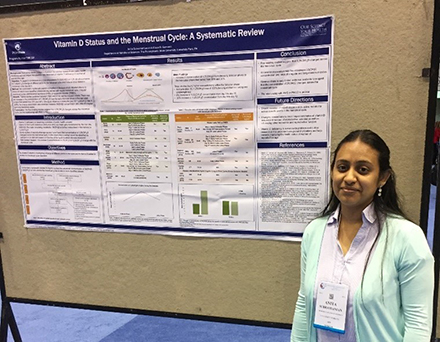By Anita Subramanian

I have always been intrigued by the famous quote from Hippocrates, "Let food be thy medicine and medicine be thy food." These words make me think deeper about the relationship between nutrition and health. I started developing an interest in learning more about nutrition when I was in high school in New Delhi, India, and had to memorize the functions, food sources, and deficiency diseases for all the macronutrients and micronutrients - nutrients that we need in large and small amounts, respectively.
My first encounter with nutrition and maternal health was in a high school class called "home science," where I planned diets for women experiencing pregnancy and lactation and prepared some select recipes. I became fascinated by the influence of diet on health. Later I came to the United States to attend college in Minnesota and received my bachelor's in nutrition.
After college, I moved back to India and worked as a research assistant in a hospital on a project that focused on vitamin D and type 2 diabetes. This project analyzed clinical data from an adult diabetic population and non-diabetic patients at a hospital in New Delhi and was the first to collect and report vitamin D levels among a diabetic population living in north India. The findings showed severe vitamin D deficiency was more prevalent among patients with type 2 diabetes compared with non-diabetics. Interestingly, diabetic men had a higher prevalence of vitamin D deficiency than diabetic women. Although my research focused on diabetes, I observed that vitamin D has a potential role in improving other health outcomes beyond its known functions in bone health.
As a master's student in India, I completed a dietetic internship, and it was during this time that I was really intrigued with the relationship between nutrition and maternal health. My interest in understanding this relationship was triggered when I visited the maternity ward to explain proper diets to pregnant women. These diet prescriptions were based on the woman's health conditions (most women followed a healthy, normal diet) and modified if she had an underlying health problem such as diabetes. I realized a lot of planning went into the diet of a pregnant woman, especially for those with health issues. I wanted to understand the role of specific nutrients in improving pregnancy outcomes. That experience furthered my interest in exploring the role of nutrition during pregnancy and inspired me to pursue a doctorate in nutritional sciences back in the United States.
During my doctoral studies at Penn State, I examined the role of vitamin D in pregnancy health and expanded my skills in epidemiology. My work aimed to improve maternal health and to help achieve better pregnancy outcomes. One of my dissertation projects examined the effects of vitamin D supplementation on maternal blood pressure during mid- to late-pregnancy.
For that work, I used data from an earlier study that had examined the effect of vitamin D supplementation during pregnancy on maternal and child health outcomes among Bangladeshi women. Study participants were in their second trimester of pregnancy and had been randomly chosen to receive one of three different doses of vitamin D or a placebo.
We found vitamin D supplementation had no effect on blood pressure among women who were 24 or 30 weeks pregnant. However, among women who were 36 weeks pregnant, blood pressure slightly rose (about 2 mm Hg) among those who had received the highest dose of vitamin D compared with women who had received the placebo without increasing health risks. The implications of these findings are uncertain because the main trial did not find effects on gestational hypertension. The mechanisms underlying the increase in blood pressure require further study.
In my current position as a postdoctoral fellow in the NIEHS Fertility and Reproductive Health Group, I can combine my interests in nutrition and epidemiology. My work in reproductive epidemiology is exciting because it allows me to receive training in advanced epidemiological methods and to continue working with vitamin D, mainly exploring its role in reproductive health and pregnancy outcomes.
One of my projects examined the association between women's vitamin D levels measured before conception and risk of miscarriage. This study enrolled women in North Carolina who were 30 to 44 years old and had been trying to conceive naturally for three months or less. We found vitamin D levels before conception were not associated with risk of miscarriage.
Our paper, once published, will be only the third to have examined preconception vitamin D levels and the potential for increased risk of miscarriage. Additional research examining the relationship between preconception vitamin D levels and miscarriage is needed.
I have always been fascinated by the power of using data to answer complex research questions. In the future, I hope to continue applying my training in data analytics to use data from diverse populations to address questions related to maternal health. My goal is to contribute to humanity's understanding of global maternal health concerns and help relieve maternal suffering.


